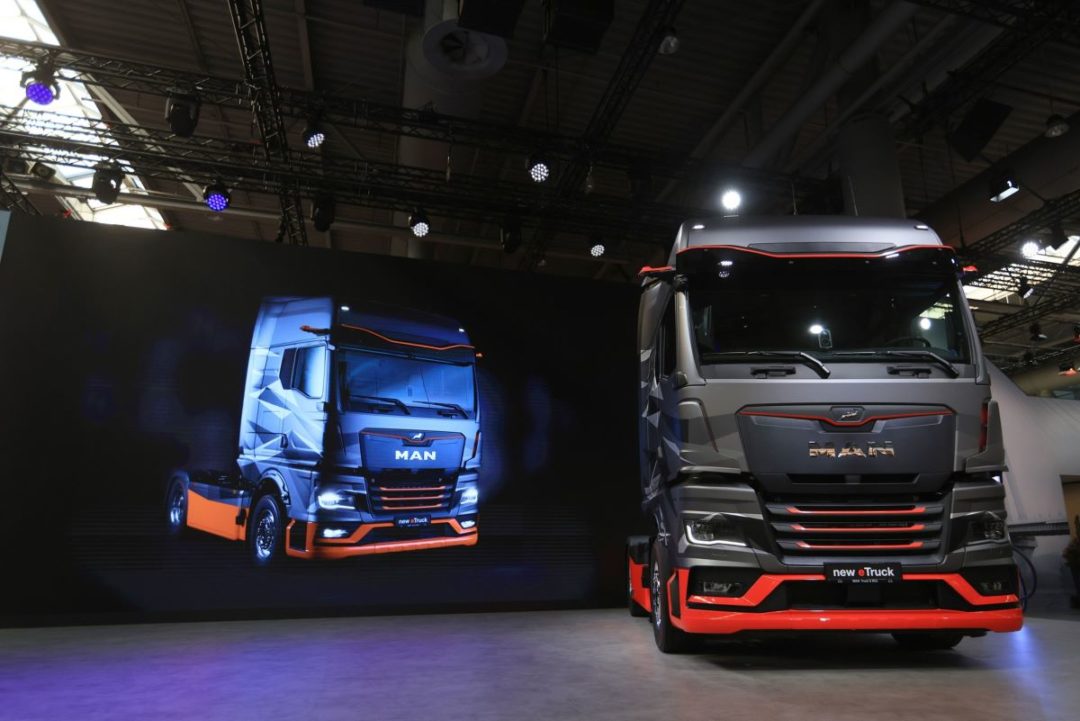
Home » Truck Duels Kick Off with Batteries Battling Fuel Cells for Top Spot
Truck Duels Kick Off with Batteries Battling Fuel Cells for Top Spot

Photo: Bloomberg
September 21, 2022
Nikola President Michael Lohscheller was beaming when he unveiled the U.S. startup’s fuel cell truck for the European market at the region’s biggest commercial-vehicle show this week.
Series production of Nikola’s Tre FCEV, which boasts a range of up to 500 miles and refueling times of 20 minutes, will start in early 2024 in Europe, Lohscheller told reporters Sept. 19 at the IAA Transportation event in Hanover, Germany.
“We believe this truck will change the world as we know it today,” he said.
But Nikola this week also began taking orders in Europe for its battery-electric Tre, which is closer to series production. The U.S. startup’s dual-technology approach — Lohscheller described it as “standing on two legs” — shows how most manufacturers haven’t yet made up their mind on which technology will become the dominant drivetrain for emissions-free commercial vehicles.
Companies like Nikola, Volvo and Daimler Truck are pursuing both battery-electric rigs and vehicles powered by hydrogen fuel cells, in a costly bet on two technologies. The odd player out is Volkswagen’s Traton, which argues that batteries will win out over fuel cells because they’re more energy-efficient.
Sweden’s Volvo, the second-biggest truck maker behind Daimler, is touting renewable fuels as an alternative to diesel and a viable third option. The company argues they’ll be needed to help make the existing fleet of combustion-engine trucks more environmentally friendly.
“It will not be one solution that fits all,” said Jessica Sandstrom, a senior vice president of global product management at Volvo Trucks. “To reach zero emissions, there are some customers who will continue to operate with a combustion engine.”
Daimler’s Mercedes-Benz Trucks is investing in both long-haul electric and hydrogen fuel cell trucks, a move that will allow the company to follow customer demand if it breaks in favor of one technology or the other. While lithium-ion batteries are generally considered ideal for short and medium-distance trips, hydrogen was long seen as the only alternative for longer, heavier hauls. Yet with surging raw material prices and a slowing global economy, the math on what works best can change quickly.
“It’s super hard to predict what will happen in 2030 and what will bring the most efficient cost of operation to the customer,” said Mercedes-Benz Trucks CEO Karin Radstrom, adding that she expects the availability of charging infrastructure and clean energy to determine how much share each technology will get.
“That’s why it's so important to develop both in parallel,” she said.
Electric Perk
Have you ever driven an electric truck? Pretty much everyone my colleague William Wilkes and I talked to at the show told me it’s a major upgrade from a diesel rig. Fossil-fired trucks have a jerky first gear that can shake the driver about in stop-start traffic, and they often produce a rumbling noise on the road. Maneuvering an electric truck is smooth, it’s virtually silent and it emits no stinky fumes.
“Many of the drivers that have driven an electric truck don’t want to go back to a diesel truck,” said Roger Alm, president of Volvo Trucks.
More stringent environmental protection rules may add to their attractiveness. In California, most trucks are allowed to idle for at most five minutes, meaning drivers waiting in line longer than that at LA port, for example, would have to turn off their AC, even when it’s really hot. Unless the battery is almost empty, that’s not an issue in an electric vehicle.
Volvo is convinced battery rigs can help counter a painful truck-driver shortage that only worsened during the pandemic.
With their smooth ride experience, electric trucks “will be a competitive advantage to attract new drivers and keep the ones you have,” Sandstrom said.
RELATED CONTENT
RELATED VIDEOS
Subscribe to our Daily Newsletter!
Timely, incisive articles delivered directly to your inbox.
Popular Stories
-

-

Charting a Sustainable Path: Retail Supply Chain Evolution in 2024
-

Diversifying Production From China: Welcome to ‘The Great Reallocation’
-

Next-Generation Packaging Brings Reliability and Visibility to Supply Chains
-

U.S. Fleet Professionals Look Toward Sustainability to Cut Down on Rising Operating Costs

2024 Supply Chain Management Resource Guide: There's Only One Way Off a Burning Platform
VIEW THE LATEST ISSUECase Studies
-
Recycled Tagging Fasteners: Small Changes Make a Big Impact
-

Enhancing High-Value Electronics Shipment Security with Tive's Real-Time Tracking
-

Moving Robots Site-to-Site
-
JLL Finds Perfect Warehouse Location, Leading to $15M Grant for Startup
-
Robots Speed Fulfillment to Help Apparel Company Scale for Growth